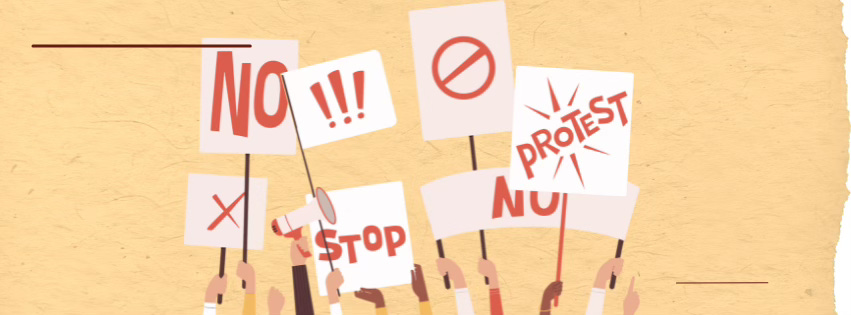We Aren’t As Indivisible As We Thought—And the Democrats Still Don’t Get It
5 Messaging Lessons the Democratic Party Needs to Learn Before It’s Too Late
Let’s not pretend things are fine. Today, I’m not really interested in diplomatic metaphors or poetic hedging. I’m fed up. As Trump openly ignores Supreme Court rulings, as federal gestapos detain legal residents protesting genocide, as measles makes a comeback like it’s headlining a retro disease tour, and as Silicon Valley billionaires inch us closer to a future where we have to rent oxygen—Democrats are busy running a dress rehearsal for the 2028 primaries.
Yes, really. While democracy wheezes on life support, the party of “Hope and Change” is huddled in strategy meetings asking, “But have we tried centrism harder?” They’re rubber-stamping Trump’s judicial and cabinet appointments like it’s Amazon Prime Day, greenlighting continuing resolutions that gut social programs, and—classic liberal move—filibustering nothing and congratulating themselves for it.
Meanwhile, Bernie Sanders and Alexandria Ocasio-Cortez are on their Fighting Oligarchy tour, reminding everyone what passion looks like and how populism doesn’t have to come wrapped in fascism. And while I love to see it, it also boils my blood. Because watching them pack arenas only dredges up one very bitter, very familiar truth: Bernie would’ve won in 2016.
That refrain haunts every Democrat who’s dared to imagine a party with a spine. And now, as I scroll through 2028 frontrunner speculation and polls and see names like Kamala Harris floating around again, I find myself in a peculiar emotional cocktail of déjà vu, existential dread, and maybe some mild nausea.
I’ve worked in political communications for most of my professional career. That means I’ve sat through the focus groups, parsed the polling crosstabs, crafted the talking points, and watched in horror as they were promptly ignored. I’ve seen what Americans respond to, what they believe in, and how badly they want to feel like someone, anyone, in Washington gives a damn. I have also seen how badly the Democratic has failed in their messaging in this post-Trump era of politics. The phrase “one nation, indivisible” doesn’t just ring hollow now—it sounds like a cruel joke when you stack it against the current backdrop of state-sponsored chaos and corporate feudalism.
So, in the spirit of trying to do something useful in these dire times, here are five things the Democrats need to do to fix their messaging problem—and maybe start actually winning elections.
1. Anchor Your Concepts—Don’t Capitulate
Draw your line in permanent ink, not dry-erase marker.
Right now, the Democratic Party’s messaging strategy is built on a foundation of vibes. “We’re not them” is not a political platform. It's a coping mechanism. The party talks about values, but rarely defines them. Instead, it offers a squishy mess of milquetoast unity language, designed to offend no one and inspire even fewer.
When the GOP says they’re going to ban abortion, ban books, and ban trans people from existing in public spaces—they mean it. They plant that flag deep in the ground. Democrats, on the other hand, say things like “we believe in reproductive justice,” then waffle when asked about codifying Roe. It’s infuriating.
Anchor your messaging in clear, strong, and morally unflinching positions. Take the risk of saying what’s right—even if it’s not polling at 70 percent. That’s how you move the needle. That’s how you lead.
2. Simplify Your Narratives and Own the Conversation
People don’t need a thesis. They need a story.
Political messaging is storytelling. Republicans understand this. They serve up simple, emotionally resonant tales—good vs. evil, us vs. them. They reduce complex issues into digestible, emotionally potent one-liners. Are they accurate? No. Are they effective? Extremely.
Democrats, by contrast, often communicate in bureaucratese. They rely on overly complex policy explanations, PowerPoint aesthetics, and terms like “means-tested” and “economic equity” that make most voters’ eyes glaze over.
Here’s the truth: if your messaging requires a footnote, it’s already lost. Say what you mean. Be bold. Give voters something they can remember, repeat, and rally behind. Own the frame. Be first. Define the terms of the debate before the right turns “green energy” into “woke communism with wind turbines.”
3. Don’t Take Every Debate Bait
You don’t have to fight every troll in the comments.
There is a difference between addressing a genuine public concern and chasing down every cultural flashpoint cooked up by Fox News at 6 a.m. Not every right-wing moral panic deserves a response. Sometimes, silence is strategy.
When you treat every bad-faith debate like it’s serious discourse, you legitimize it. You help spread it. And worst of all—you waste your own political capital.
For example: if the debate is “Should we ban books that mention LGBTQ+ people?”—the answer is not a nuanced policy proposal. The answer is: No. Are you insane? Then move on. There are real issues—like healthcare, wages, housing, climate—that the majority of Americans care deeply about. Talk about those. Stay on your turf. Elevate your agenda, not theirs.
4. Words Mean Nothing Without Action
You can’t message your way out of being useless.
No amount of slick branding can cover up the fact that Democrats often promise things and then… don’t deliver. And yes, I understand the structural obstacles. But voters don’t care that Joe Manchin is mean to you. They care that insulin still costs $300. They care that their rent has doubled. They care that the minimum wage hasn’t budged in over a decade.
If you want people to trust you, do something worth trusting. And then tell that story—loudly, proudly, and repeatedly. But you have to earn that story first. Otherwise, your messaging is just noise.
Here’s the real kicker: when you actually pass good policy, it makes the messaging easy. You don’t have to spin it. You don’t have to rely on consultants telling you which shade of blue feels “authentic.” You just tell people what you did—and they feel it in their lives.
5. This Might Be the Most Important One: LEARN A FUCKING LESSON
Please, for the love of all that is holy, stop trying the same thing and expecting different results.
Looking at the early 2028 polling and seeing names like Kamala Harris at the top of the list sent me into a brief but intense existential spiral. Not because she’s uniquely terrible, but because it shows the party hasn’t learned a thing. After the disaster that was 2024—where Trump waltzed back into office with fewer ideas than a middle school book report—you’d think the Democrats would have taken a hard look in the mirror.
Instead, we’re back on the same hamster wheel. Looking for the next Obama. Obsessing over electability. Playing the safe card. Newsflash: safe doesn’t inspire anyone. And electability doesn’t mean anything if your base stays home.
Try something radical: listen to voters. Stop recycling candidates from the same dusty Rolodex. Stop treating progressives like a liability. And stop pretending the center will save you—it won’t.
This Isn’t Just About Messaging. It’s About Vision.
At its core, the Democrats’ messaging problem is a vision problem. What does the party want to build? What kind of country are you trying to create? If you can’t answer that in a sentence, you’re not leading—you’re flailing.
Republicans want to dismantle the state, privatize everything, and control your body and books. Horrifying? Yes. But at least it’s a vision. Democrats need to articulate one of their own—one that’s bold, just, and worth fighting for.
Because right now, we’re not “one nation, indivisible.” We’re a fraying patchwork, held together by court injunctions and vibes. And unless the Democratic Party wakes up, stops navel-gazing, and starts leading, we’re going to find out just how divisible we really are.










Excellent! Concise, powerful, and brutally accurate. Thanks for writing this!